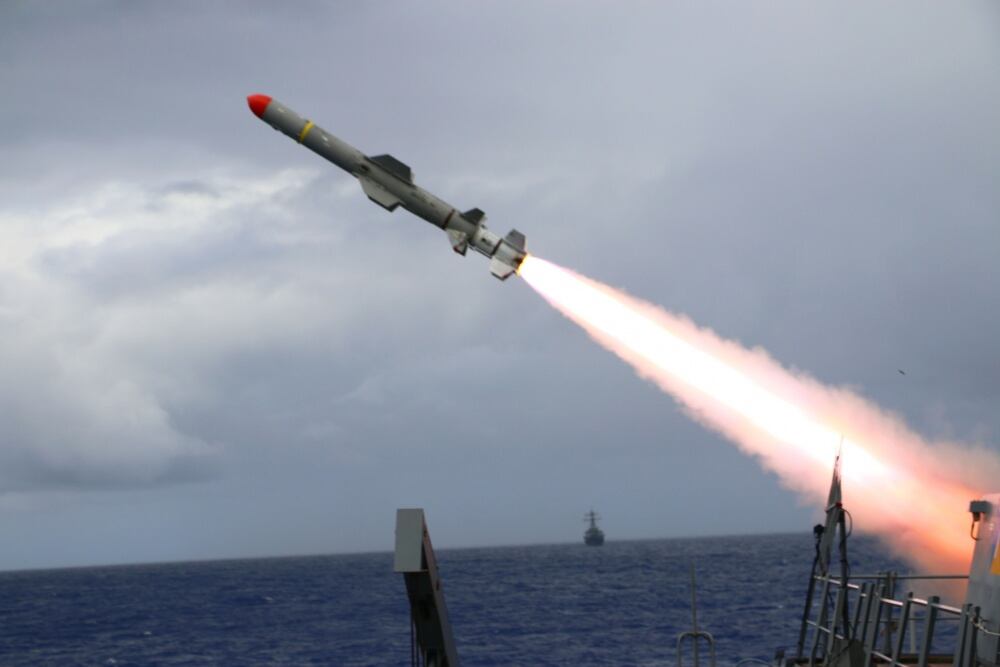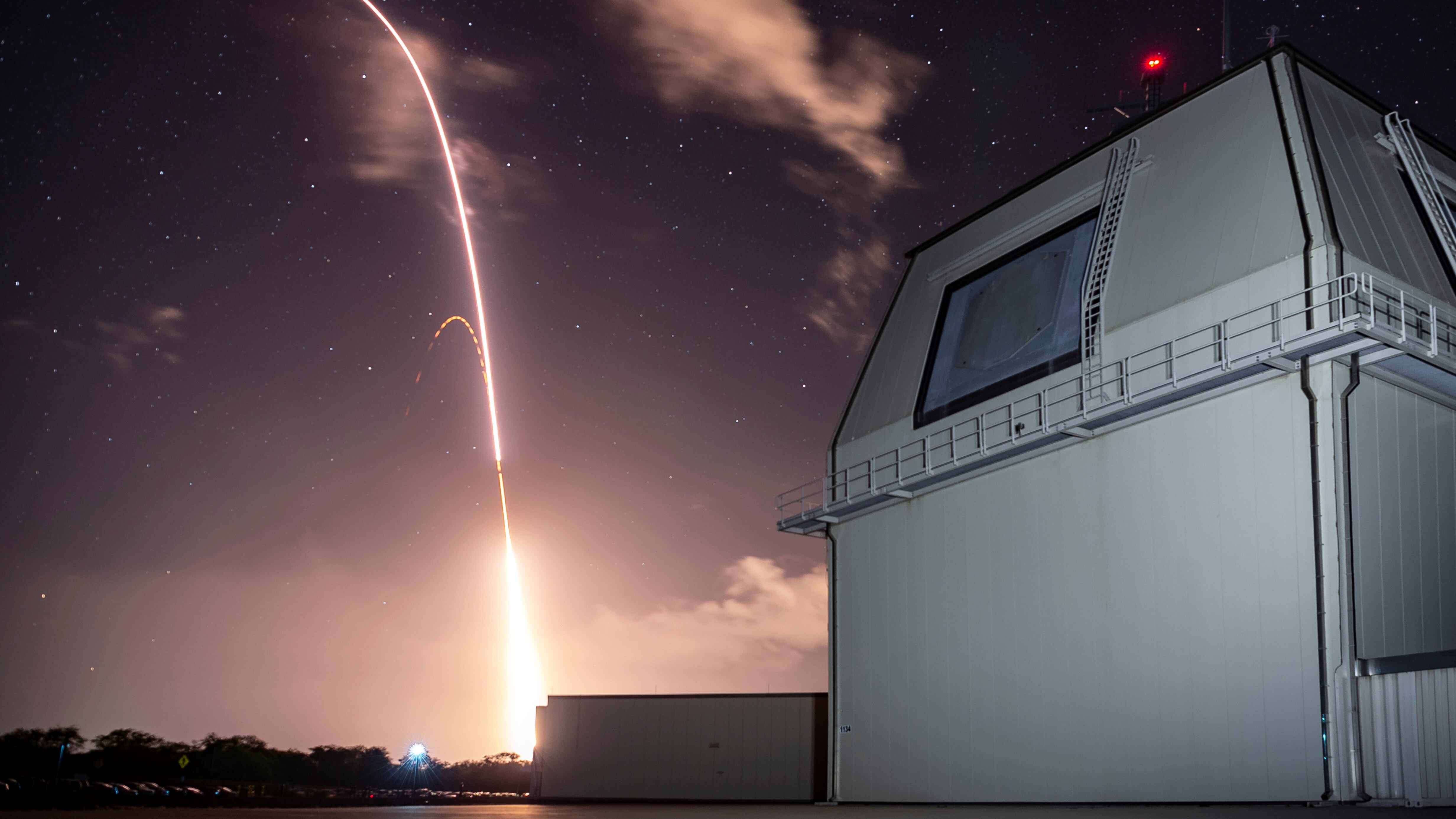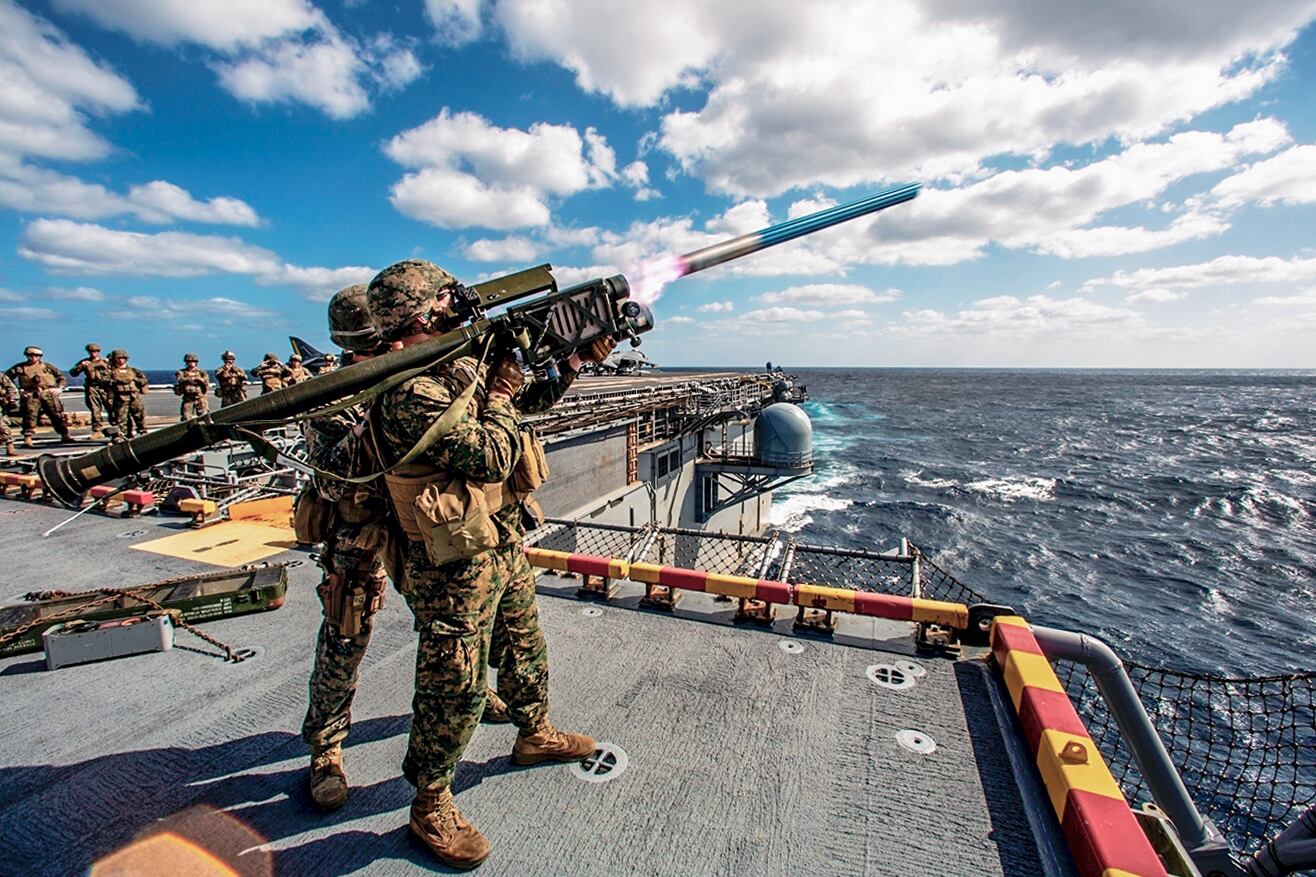Correction: A quote from Lara Crouch contained a couple of erroneous words. Those quotes have been edited for accuracy.
WASHINGTON — Nearly a dozen Dongfeng ballistic missiles flew over Taiwan earlier this month as China conducted its largest-ever military exercises in the nearby strait as a response to U.S. House Speaker Nancy Pelosi visiting Taipei.
During these drills, Chinese naval forces for the first time positioned themselves on the eastern side of Taiwan, fully encircling the island. China’s message was clear: Beijing could easily blockade the island, wreaking havoc on global supply chains and preventing the United States and allies from delivering weapons to the Taiwanese military.
The incident prompted U.S. lawmakers to emphasize the need to export as many weapons to Taiwan as possible as part of the so-called porcupine strategy meant to deter China from blockading — or outright invading — the island. U.S. weapons serve as the metaphorical quills in this strategy, but Taiwan is facing a $14 billion backlog in foreign military sales from the United States.
Even though the U.S. views these weapons sales as integral to deterring China from attacking Taiwan, some still-unfulfilled deals were publicly announced as far back as 2017.
“We need to start having new ways to flow capability to Taiwan before the situation gets even worse,” Lara Crouch, a Republican staffer on the Senate Foreign Relations Committee, said at a Heritage Foundation panel in August. “Our ultimate goal is that Taiwan is strengthened and in the best possible position to thwart [the Chinese People’s Liberation Army] objectives and to give ourselves options in terms of how we respond.”
“There must be a permanent linkage between U.S. policy on arms sales to Taiwan and the degree to which the threat from Beijing either increases or decreases,” she added, noting the weapons give Taipei “the ability to defend itself in the case of a full invasion, a cyberattack or other scenarios.”
Congress is moving to address the backlog in sending weapons to Taiwan, as well as other potential delays in arms sales to Japan, South Korea, Australia and New Zealand.
House Foreign Affairs Committee Chairman Gregory Meeks, D-N.Y., told Defense News that the panel is “working on bills now to help expedite and to reduce red tape to get defense items that are needed out in a quicker fashion.”
In the meantime, the massive weapons backlog illustrates how the unwieldy, slow-moving Foreign Military Sales process is undermining U.S. efforts to deter Beijing in the Pacific region.
The reasons — including government delays, supply chain issues and production requirements — are numerous, and the problem won’t be easy to fix, Rep. Mike McCaul, R-Texas, the ranking member on the committee, told Defense News.
“It’s kind of like moving a big ship — turning a ship around — and so it’s a very complex issue,” he said.
The process
The foreign military sales process formally begins when a potential customer submits a letter of request for a given American-made weapon system. Then the Defense and State departments each conduct a series of reviews, assessing a range of issues including the risk of disclosing sensitive, classified technology as well as potential human rights concerns with the interested country.
Once these reviews are complete, the State Department can decide to approve the sale and certify it serves U.S. national security interests. If that takes place, the Pentagon’s Defense Security Cooperation Agency would disclose the deal to the public and formally notify Congress. After the 30-day congressional review period, the United States government — with Congress’ backing — sends the foreign purchaser an official letter of offer and acceptance.
That leads to what can be a lengthy, even yearslong, process of signing a final contract. And U.S. arms manufacturers typically do not begin production of a weapons system until they receive that final contract from the Defense Department.
Issues with the unwieldy Foreign Military Sales process have persisted for years, but recent pandemic-related supply chain issues within the defense-industrial base have exacerbated the delays.
“There’s always a lot of finger-pointing on this, but it really depends on the sale,” Crouch said, regarding causes of slow deliveries. “Sometimes it’s a State Department issue. Sometimes it’s a [Defense Department] issue. ... And sometimes it’s an industry issue.”
The U.S. government has approved the sale of 10 weapons systems Taiwan has yet to receive — some of which are not slated for delivery until the end of the decade.
Right now, the U.S. is intensely focused on getting weapons to Ukraine and its European allies as Kyiv seeks to fend off a Russian invasion.
The United States is “backfilling the eastern flank of NATO,” McCaul said. “They’re putting all their weapons in Ukraine.”
The United States has flooded billions of dollars in weapons into Ukraine, including items that are part of Taiwan’s backlog, such as Harpoon anti-ship missiles, Stinger anti-aircraft missiles and High Mobility Artillery Rocket Systems.

“Given the various needs that we’re trying to supply with regard to Ukraine, there’s increased stress on the supply chain within the defense-industrial base,” said Rep. Raja Krishnamoorthi, D-Ill., at a news conference following his visit to Taiwan with Pelosi, D-Calif.
While Ukraine takes center stage, Taiwan remains behind several other countries in the queue for items Washington promised to send.
For example, several Middle Eastern and Eastern European countries are ahead of Taiwan in Lockheed Martin’s F-16 production queue. In 2019, the State Department approved an $8 billion sale to Taiwan for 66 of the fighter jets, but Taipei does not expect to receive the aircraft until 2026.
“Saudi Arabia is still ahead of Taiwan on the priority list in some cases,” Rep. Mike Gallagher, R-Wis., told Defense News ahead of a July meeting with Taiwan’s Washington envoy. “We need to take a look at that.”
The Defense Department did not reply to Defense News’ repeated requests for comment on the stalled contracts as well as the backlogged items to Taiwan and other Pacific partners.
“Backlogs are a constant and persistent issue with the Foreign Military Sales program writ large,” Sen. Bill Hagerty, R-Tenn., who served as ambassador to Japan under the Trump administration, told Defense News. “It occurs in every nation that’s our partner.”
And even when the approval process goes smoothly, sales can fall through. Take Japan’s cancellation of its planned purchase of Aegis Ashore missile defense systems. The country initially sought to purchase the systems to ward off North Korean missile threats, estimating the combined upfront cost and 30 years of maintenance would total $2.15 billion.
The U.S. Defense Security Cooperation Agency used the Japanese cost estimate when it publicly announced the sale in 2019, but there was a problem: That estimate proved to be wildly inaccurate.
Japan later realized the total cost would come in at $4.1 billion, nearly double its initial assessment.

It’s already difficult at times for U.S. allies to accurately gauge the cost of lower-tier weapons, and that process becomes more complicated for higher-end systems, such as Aegis Ashore.
Additionally, public backlash emerged in the two rural areas of Japan slated to host the Aegis Ashore systems following reports that Japanese military planners used Google Earth to select the locations instead of visiting the prefectures.
Despite receiving U.S. approval to proceed, Japan scrapped the sale in 2020, citing public backlash, but not the miscalculated financial projection.
Addressing the problem
Now, Congress is kicking off a variety of efforts meant to improve the process and, in turn, speed weapons deliveries to allies.
The Defense and State departments each conduct reviews that can take months or even years before approving a foreign military sale. Congressional staffers seeking to hasten the process singled out one review in particular for reform.
The technology security and foreign disclosure review, which requires the Defense Department’s National Disclosure Policy Committee to assess whether it’s in U.S. national security interests to transfer sensitive, classified technology to a potential customer, can take more than a year. This is particularly true for some advanced arms sales to Asian customers, where sensitive tech could end up in the hands of China during a conflict.
Crouch said Congress is interested in shortening that review, while maintaining its integrity.
“We don’t want to just throw our tech out everywhere, and we need to protect it,” she said. “We need to figure out how we can improve that process.”
The Senate will take the first stab at concrete action to address Taiwan’s backlog in September when the Foreign Relations Committee plans to mark up the sprawling Taiwan Policy Act.
The bipartisan bill would provide $4.5 billion in military aid to Taipei via Foreign Military Financing — a program that provides foreign countries the ability to purchase U.S. military equipment with grants and loans.
While that aid would help Taiwan purchase more U.S. weapons, its architects realize that becomes less relevant so long as the arms sale backlog persists. To that end, the bill would also require the Defense and State departments to “prioritize and expedite” foreign military sales for Taiwan.
Furthermore, it would prohibit both departments from delaying the sales through a bundling route, whereby a defense manufacturer would simultaneously produce weapons systems from multiple contracts.
Additionally, the legislation would designate Taiwan as a major non-NATO ally — a designation that helps expedite arms transfers. It would also allow the president to “establish a war reserve stockpile for Taiwan that consists primarily of munitions.”

The stockpile would allow the U.S. to pre-position munitions and potentially other assets in Taiwan for use against a Chinese attack. The bill would allocate $500 million per year for the war reserve stockpile through 2025.
More broadly addressing the arms sale process, the House Foreign Affairs Committee advanced last month by voice vote the Arms Exports Delivery Solutions Act, which would require a joint Defense Department and State Department report on foreign military sales worth $25 million or more to Taiwan, Japan, South Korea, Australia and New Zealand, dating back to 2017.
The bill, introduced by Rep. Young Kim, R-Calif., requires the report to detail reasons for any delay in expected arms delivery dates to those countries while identifying interim capabilities to fill the gap caused by any backlog. Lawmakers also added Kim’s legislation as an amendment to the annual defense authorization bill, which the House passed 329-101 last month.
So far, much of Congress’ work to address the backlog has been “informal,” according to Sen. Todd Young, R-Ind., who sits on the Foreign Relations Committee. But he said part of that effort included “pressing suppliers to do everything we can to expedite delivery of materiels to Taiwan.”
McCaul said defense manufacturers should display more “innovation, agility and flexibility” in scaling up production to meet the ever-growing demand for U.S. weapons.
For his part, Hagerty pointed to foreign military sale “tiger teams” to help resolve some problems with the process.
A tiger team is a group of technical specialists assembled to resolve a specific problem set. Hagerty envisions a group of specialists from the United States and each partner country hammering out some of the thorniest issues in the arms sales process, such as differing security assessments and procedural stumbling blocks.
In the case of Taiwan, the country has sometimes taken two years or longer to assess the weapons it needs, project costs and pass a budget to procure the equipment from the United States before it even submits the letter of request that formally kicks off the Foreign Military Sales process.
Tiger teams could potentially decrease the amount of time this takes by improving communication between Washington and Taipei to deconflict on potential issues before formally initiating a sale. Hagerty said he used tiger teams when he was ambassador to Japan to find “process improvement opportunities” that cut down on the arms sale timeline for Tokyo.
“I’ve spent a tremendous amount of effort to reduce the backlog by putting together process improvements that would take down the amount of time required to get through the Foreign Military Sales process,” Hagerty said. “Our foreign government partners also have process improvement opportunities that they need to be pursuing.”
In 2020 — the year after Hagerty resigned as ambassador to run for the Senate — reports emerged that Japan was considering canceling the purchase of three RQ-4 Global Hawk surveillance drones, which the State Department approved in 2015. At issue was a 23% projected increase in the cost of each system due to the fact the U.S. Air Force had stopped buying the drones from Northrop Grumman.
But the outcome ended differently than the ill-fated Aegis Ashore sale. Japan ultimately opted to proceed with the RQ-4 sale despite the projected cost increase. Northrop Grumman began test flights of the drones for Japan in 2021, and delivery is slated for this year.
Bryant Harris is the Congress reporter for Defense News. He has covered U.S. foreign policy, national security, international affairs and politics in Washington since 2014. He has also written for Foreign Policy, Al-Monitor, Al Jazeera English and IPS News.





